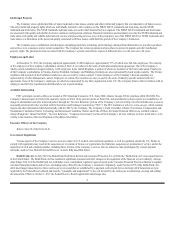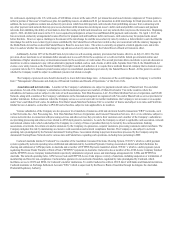First Data 2013 Annual Report Download - page 20
Download and view the complete annual report
Please find page 20 of the 2013 First Data annual report below. You can navigate through the pages in the report by either clicking on the pages listed below, or by using the keyword search tool below to find specific information within the annual report.
Future consolidation of client financial institutions or other client groups may adversely affect the Company’s financial condition.
The Company has experienced the negative impact of the substantial bank industry consolidation in recent years. Bank industry consolidation impacts
existing and potential clients in the Company’s service areas, primarily in Financial Services and Retail and Alliance Services. The Company’s alliance
strategy could be negatively impacted as a result of consolidations, especially where the banks involved are committed to their internal merchant processing
businesses that compete with the Company. Bank consolidation has led to an increasingly concentrated client base in the industry, resulting in a changing
client mix for Financial Services as well as increased price compression. Further consolidation in the bank industry or other client base could have a negative
impact on the Company.
Changes in credit card association or other network rules or standards could adversely affect the Company’s business.
In order to provide the Company’s transaction processing services, several of the Company’s subsidiaries are registered with Visa and MasterCard and
other networks as members or service providers for member institutions. As such, the Company and many of its customers are subject to card association
and network rules that could subject the Company or its customers to a variety of fines or penalties that may be levied by the card associations or networks
for certain acts or omissions by the Company, acquirer customers, processing customers and merchants. Visa, MasterCard and other networks, some of
which are the Company’s competitors, set the standards with respect to which the Company must comply. The termination of the Company’s member
registration or the Company’s status as a certified service provider, or any changes in card association or other network rules or standards, including
interpretation and implementation of the rules or standards, that increase the cost of doing business or limit the Company’s ability to provide transaction
processing services to or through the Company’s customers, could have an adverse effect on the Company’s business, results of operations and financial
condition.
The Company’s business may be adversely affected by risks associated with foreign operations.
The Company is subject to risks related to the changes in currency rates as a result of its investments in foreign operations and from revenues generated
in currencies other than the U.S. dollar. Revenue and profit generated by international operations will increase or decrease compared to prior periods as a result
of changes in foreign currency exchange rates. From time to time, the Company utilizes foreign currency forward contracts or other derivative instruments to
mitigate the cash flow or market value risks associated with foreign currency denominated transactions. However, these hedge contracts may not eliminate all
of the risks related to foreign currency translation. Furthermore, the Company may become subject to exchange control regulations that restrict or prohibit the
conversion of its other revenue currencies into U.S. dollars. The occurrence of any of these factors could decrease the value of revenues and earnings the
Company derives from its international operations and have a material adverse impact on the Company’s business.
For example, in January 2014, the Argentinian peso experienced a large devaluation, which will adversely affect the Company’s business and results of
operations for 2014. Going forward, additional devaluations could have further adverse impacts on the Company’s business and results of operations in
Argentina.
Failure to protect the Company’s intellectual property rights and defend itself from potential patent infringement claims may diminish the
Company’s competitive advantages or restrict it from delivering the Company’s services.
The Company’s trademarks, patents and other intellectual property are important to its future success. The FIRST DATA trademark and trade name
and the STAR trademark and trade name are intellectual property rights which are individually material to the Company. These trademarks and trade names
are widely recognized and associated with quality and reliable service. Loss of the proprietary use of the FIRST DATA or STAR trademarks and trade names
or a diminution in the perceived quality associated with them could harm the growth of the Company’s businesses. The Company also relies on proprietary
technology. It is possible that others will independently develop the same or similar technology. Assurance of protecting its trade secrets, know-how or other
proprietary information cannot be guaranteed. The Company’s patents could be challenged, invalidated or circumvented by others and may not be of
sufficient scope or strength to provide the Company with any meaningful protection or advantage. If the Company was unable to maintain the proprietary
nature of its technologies, the Company could lose competitive advantages and be materially adversely affected. The laws of certain foreign countries in which
the Company does business or contemplates doing business in the future do not recognize intellectual property rights or protect them to the same extent as do
the laws of the United States. Adverse determinations in judicial or administrative proceedings could prevent the Company from selling the Company’s
services or prevent the Company from preventing others from selling competing services, and thereby may have a material adverse effect on the business and
results of operations. Additionally, claims have been made, are currently pending, and other claims may be made in the future, with regard to the Company’s
technology allegedly infringing on a patent or other intellectual property rights. Unfavorable resolution of these claims could either result in the Company being
restricted from delivering the related product or service or result in a settlement that could be materially adverse to the Company.
19
























